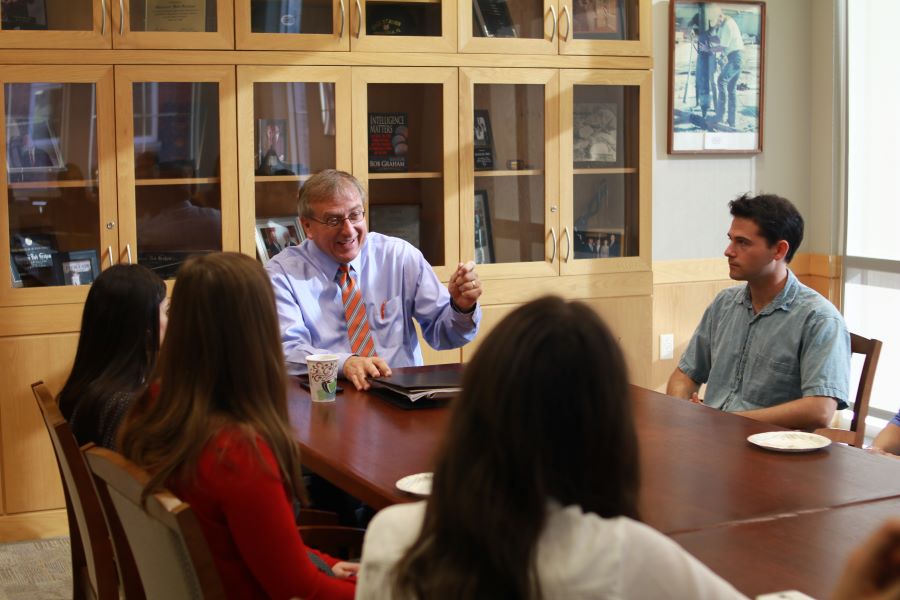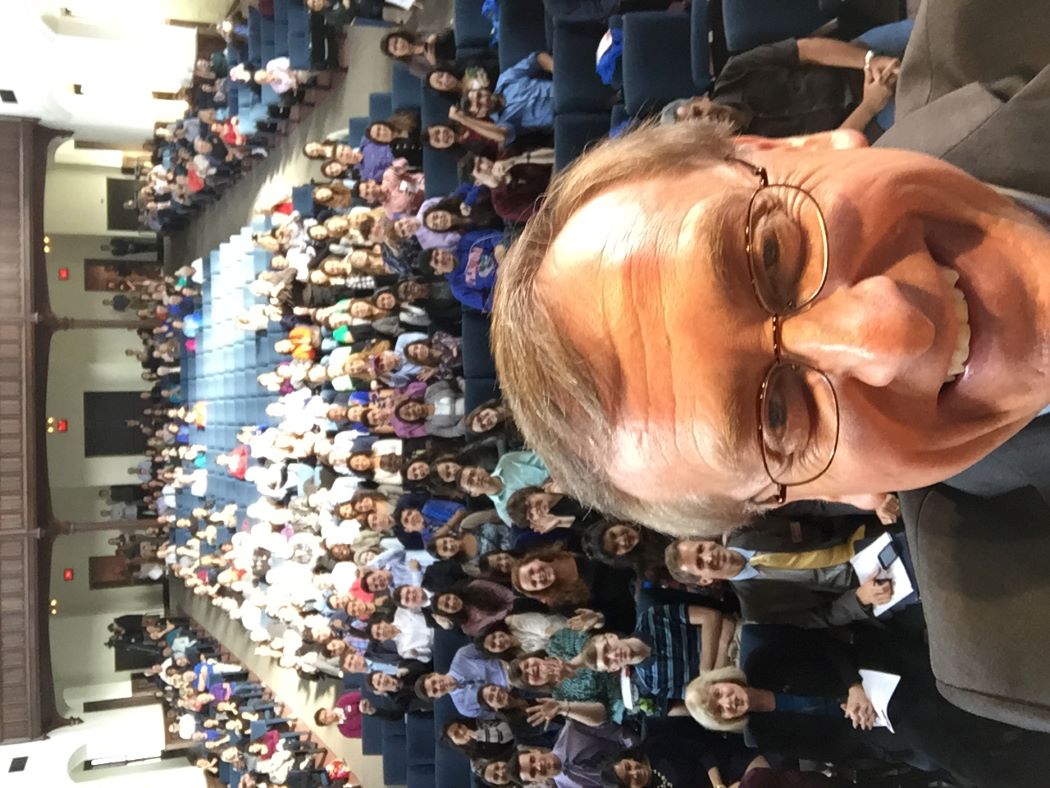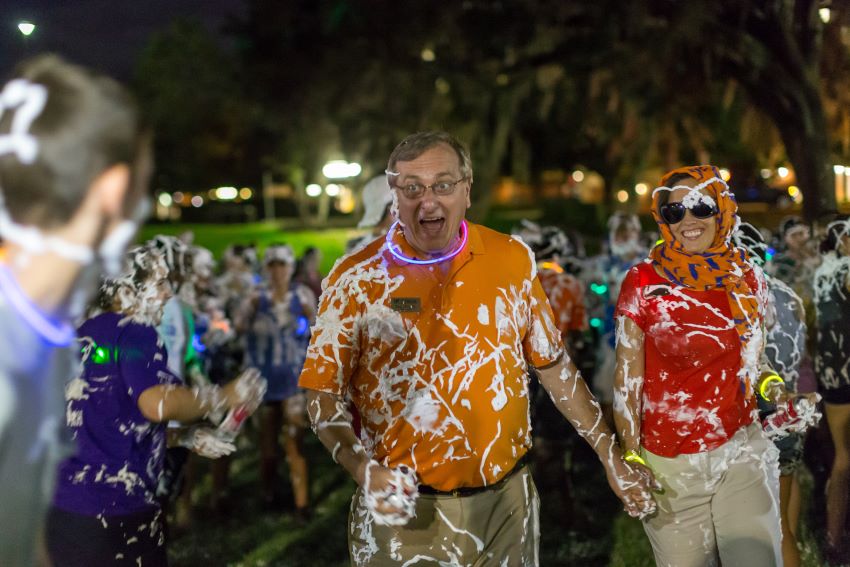With a freshly earned engineering degree from Duke University in 1977, Kent Fuchs’ career took an unusual detour.
His heart was telling him to become a minister, so instead of pursuing electrical engineering, he entered divinity school.
All went well until his coursework in homiletics – a fancy word for preaching, he says. The feedback from his professor was brutal.
“I was told I couldn’t write or deliver a sermon in a way that stirred people’s emotions; I could inform but I couldn’t inspire,” Fuchs recalls. “It’s hard to be a pastor if you can’t move people with your words.”
Fuchs returned to his first love of engineering. However, he committed to working every day to become a more effective communicator.
“I couldn’t preach, but I could teach,” Fuchs says. “In fact, I came to realize I enjoyed being an educator.”
Fuchs went on to carve out an impressive career as an engineering professor and academic leader that led to the University of Florida presidency in 2015. As he prepares to transition out of that role and back to teaching, the man who chose not to become a pastor because he thought he didn’t have what it takes to inspire others has guided The Gator Nation to the promised land as one of its most inspirational and consequential leaders.
“Kent Fuchs’ leadership has been nothing short of transformational,” says UF Board of Trustee Chair Mori Hosseini. “His vision and aspirations for our university have raised our collective thinking about what is possible, and as a result, more people than ever in the great state of Florida, across the nation and around the world are benefitting from the University of Florida’s impact.”

President Fuchs meets with a group from the Bob Graham Center for Public Service
Raising UF’s stature on the national stage
Fuchs announced in January that this would be his last year as president, capping an eight-year tenure characterized by unprecedented progress: UF made a steep climb in the U.S. News & World Report rankings, cracking the top 10 for the first time in its history and ascending to No. 5 among public universities. The university created 500 new faculty positions, lowering the faculty-to-student ratio to 17:1, and has nearly completed the addition of 100 new faculty in artificial intelligence, ensuring all students have the opportunity to learn how AI can be applied to their careers in their fields.
The university’s research enterprise also flourished, becoming a national powerhouse as Gator scientists pulled in more research dollars year after year, breaking the $1 billion milestone in research spending during fiscal year 2022. That puts UF in an elite group of only a dozen other public universities nationwide.
The university also embarked on its most ambitious infrastructure project in decades, known as the Strategic Campus Master Plan. The nearly $2 billion in projects will add 1 million square feet to the campus and renovate many of its existing spaces. Some of the game-changing projects completed or underway include the Malachowsky Hall for Data Science & Information Technology, a new Student Health Care Center, the Honors Residential College and the Heavener Football Training Center.
When Fuchs arrived, the university’s yearly fundraising totals were just over $300 million, and today they are over $750 million. In fact, the Go Greater capital campaign, launched publicly in 2017, is likely to reach more than $4.2 billion by the time it concludes, comfortably eclipsing its original goal of $3 billion.
“Kent Fuchs has led UF through a remarkable period of growth and prosperity that has raised our stature even higher on the national stage,” says Anita Zucker, a member of UF’s Board of Trustees and a graduate of the UF College of Education. “And he has done so with genuine warmth, as well as love for everyone at UF.”

Early in his presidency, Kent Fuchs takes his first-ever selfie while on stage for the Innovation Academy's convocation.
Purposeful fun
But numbers alone don’t tell the story of the Fuchs presidency. Those who have worked closest to him agree that as much as he accomplished, Fuchs’ legacy will be influenced by his kindness, sense of humor and caring nature – qualities that especially endeared him to students.
“He loves the students,” says David Bloom, former chair of the UF Faculty Senate. “It is amazing how much he accomplished in elevating UF as a leader in the academic world, but his dedication to UF’s core mission of educating the next generation is what makes him so special.”
As Fuchs and his wife of 41 years, Linda, prepared for their move to Gainesville from Ithaca, New York, where Fuchs was provost at Cornell University, they made a pact. If they were going to take on the positions of president and first lady of UF, they would welcome everything that came with the jobs.
“We decided together that we would embrace it all — the high visibility, the student events, athletics, meeting with alumni, everything,” Fuchs says. “We would lean into it and enjoy it.”
Lean into it they did. In addition to attending almost every Gator event, commencement ceremony, alumni gathering and student celebration, Fuchs famously sought to spend as much time as possible around students, like the times he and Linda lived among freshmen in a residence hall for a week. Fuchs on occasion spent the first day of semesters in a chauffeur’s hat, delivering students to their classes in a VIP “Campus Cab.” He also became known for his elaborate April Fools’ Day pranks, including a fake press conference in 2016 in which he and former FSU president John Thrasher announced plans to merge the two schools and create a “super preeminent” university on a shared campus in tiny Perry, Florida.
“Those were my favorite,” Fuchs says, smiling at the memories. “We did all those things to engage with the students, and those are not things I would do naturally. I am a quiet, shy computer engineer.”
Shy or not, students loved him, lining up to take selfies with him whenever he walked around campus.
“I knew he was a different kind of president when I spotted him at the annual shaving cream fight,” says Zachariah Chou, a 2020 journalism graduate who worked closely with the president through his involvement with the Bob Graham Center for Public Service and as a student government senator and opinions writer and editor for the Alligator student newspaper.
While the practice of “purposeful fun,” as Fuchs calls it, is part of his approach at life and work, his tendency to feel joy has helped lighten the load of responsibilities for himself and those around him. It also has allowed him to leverage his position in a way that has underscored the caring nature of UF and the warmth and friendliness of its students and employees.
“I work hard on the messages I communicate, whether they are in a video, a tweet or a column in the Alligator,” he explains. “I want to convey that UF is an institution that indeed has aspirations; that we’re working to improve in every area, but yet, we care about each other and support each other.”

Kent and Linda Fuchs enjoy the annual Inter-Residence Hall Association shaving cream fight with entering students.
An era to be remembered
While purposeful fun was a cornerstone of the Fuchs presidency, another was his deliberate and calculated approach to help usher in several opportunities for the university that will forever alter UF’s footing in the state and across the country.
“As our leader, President Fuchs moved the university forward in all dimensions — more than ever before,” says Win Phillips, Fuchs’ executive chief of staff. “It was an era to be remembered.”
That degree of momentum can often be traced to one spark that ignited the progress. For UF, it was a promise Fuchs made publicly during his first months on the job and kept repeating.
“He was the first person to say we were going to be a top 5 university,” says Phillips. “I didn’t believe it, and a lot of people wanted him to stop saying it.”
Maybe it was his inner preacher, but Fuchs decided to use his platform as university president to passionately set the bar high. He believed moving UF from No. 14 to within the top 10 was not going to be easy, but it was “absolutely achievable.”
“As we worked behind the scenes tracking every metric, publicly we needed a truly aspirational goal,” he explains. “Top 5 was a stretch, but we needed to stretch.”
Using a combination of bold optimism and mathematical precision, Fuchs and Glover engineered a strategy that addressed each of the metrics used in the U.S. News rankings and comprised participation from across the campus. In 2017, UF broke into the top 10 among all U.S. public universities, rising steadily to No. 5 in 2021.
“Rankings are important to the outside world, and therefore, they are important for us,” he says. “What I’m most proud of is that every one of our 16 colleges is stronger today than it was in 2014. Not many universities can say that.”

In September 2021, UF ranks fifth in U.S. News & World Report's ranking of top colleges and stays there through 2022.
Cammy Abernathy, dean of the Herbert Wertheim College of Engineering, says her college was thrilled when an engineer was chosen to the lead UF.
“It was the first time the UF president was an engineer, and President Fuchs has made us proud by providing exceptional leadership across the entire UF enterprise,” she says. “As we have forged new initiatives and risen in the ranks nationally, more and more people are drawn to UF, including students, faculty and industry.”
With success and praise came inevitable challenges, none greater than the COVID-19 pandemic.
Although UF faced public scrutiny and criticism at certain points during the pandemic, Fuchs kept his focus on ensuring the university’s 60,000 students and 35,000 employees were as safe as possible, while keeping the university operating. When the long-anticipated COVID-19 vaccines were finally released, he was first in line to encourage uptake of the shot by inviting a videographer to watch him be vaccinated.
“I am proud of how the university has managed many of these situations despite our constraints – how people came together and worked for the good of everyone,” Fuchs says.
David R. Nelson, M.D., senior vice president for health affairs UF and president of UF Health, says he, too, admired how Fuchs guided the university community and supported the health system during the pandemic.
“The mark of a true leader is how they answer the call to serve and how they step up in the face of challenging times,” Nelson says. “And when vaccines became available, Kent was among the first to roll up his sleeve as part of a massive vaccination effort, demonstrating the importance of cultivating a culture of care and compassion for each other during especially trying times. He has demonstrated a whole lot of Gator spirit and has been a key part of what makes this university so great.”
Chou, who now serves as an opinions editor for Gannett newspapers in Georgia, believes the university was “blessed to have President Fuchs at the helm during COVID.”
“He handled things with grace, and he stuck the landing as he guided us through those tough times,” Chou says.
Fuchs looks forward to returning to the classroom, where he plans to teach digital logic, an auditorium-size class for engineering undergraduates, but he will miss his current job.
“I’m so proud that we fulfilled the commitments we made to the Board of Trustees and to the university,” Fuchs says. “Linda and I also met our personal goal to have fun and to enjoy the ride.”
He also takes pride in how the university community has united to create a culture of high achievement as well as caring and fun.
“I tried to touch people's emotion and reach their hearts, not just their minds.”